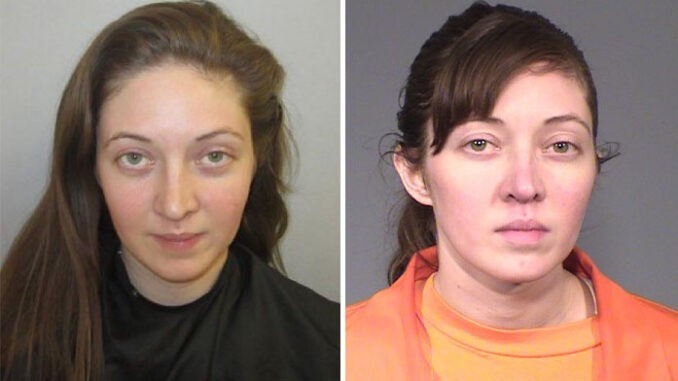
A Sierra Vista woman twice convicted of stabbing her daughter’s father to death in 2010 won’t be allowed to argue for a third trial, after a Cochise County judge ruled last week that the defendant waited too long to test hairs found in the dead man’s hands.
Pro Tempore Judge Terry Bannon also ruled Ajelina “AJ” Roth Lewis failed to demonstrate how the jury’s verdict would have differed if they knew some strands of long dark hair found clenched in William Palmer’s hands which didn’t belong to Lewis. The source of those hairs has been referred to as a “mystery person” in court filings.
Palmer was found the morning of March 12, 2010 in a fetal position on the bedroom floor of his apartment with nearly 25 stab wounds. Lewis, who was in the apartment the night before, had long dark hair, as did Palmer’s recent girlfriend who had previously lived in the apartment he shared with his uncle.
Lewis has stated Palmer was alive when she fled his apartment after an unknown man appeared in the doorway of the bedroom. She notified authorities of concerns for Palmer’s safety several hours later, leading police to discover his body.
A jury convicted Lewis of first-degree murder in 2011 but a retrial was ordered after the prosecutor made improper comments to the jury. A different jury found Lewis guilty in 2014 of second-degree murder, leading to a 16-year prison sentence. Prison records show she is scheduled to be released in 2029.
Then-prosecutor Brian McIntyre, who is now the elected Cochise County Attorney, was not obligated to subject the hairs to forensic or DNA testing because the items were never presented by the State as evidence against Lewis.
In 2017, the trial judge appointed attorney Harriette Levitt to address whether several items seized from the murder scene may include potentially exculpatory evidence that would benefit Lewis’ defense. Levitt later obtained a court order requiring Cochise County to pay nearly $8,000 for analysis of several of the items, including the hairs.
At Levitt’s request, the hairs were compared to the DNA of a Sierra Vista man convicted of the 2011 fatal stabbing of an elderly Sierra Vista resident. There was no match. McIntyre also had the hairs compared to Palmer and his uncle’s DNA. No match either.
However, the voluminous court file shows Lewis and her trial attorneys never took steps to compare the genetic profile of the mystery person’s hairs to law enforcement databases or Palmer’s former live-in girlfriend. And that, according to Bannon’s ruling, is part of the problem.
Bannon adopted the case when the trial judge retired in January. She was asked by Levitt to hold an evidentiary hearing so Lewis could argue that the unidentified hairs constitute newly discovered material facts which would have “probably” changed the jury’s verdict.
An evidentiary hearing is the first step to asking for a new trial. But on Nov. 6 the judge ruled Lewis is not entitled to such a hearing because the defense always knew of the crime scene evidence. And no one prevented Lewis’ attorneys from testing the hairs, thus there was no newly discovered facts, Bannon ruled.
“The hairs and the mitochondrial DNA testing procedures were available before her trial in 2011 and before her trial in 2014 and could have been raised as part of her defense at any time at either trial,” Bannon noted. “That the State did not present the hairs as evidence in its case in chief did not preclude the defendant from presenting them in her defense at either, or both trials.”
McIntyre is pleased with the judge’s ruling but says his office is prepared for further proceedings if Lewis files an expected appeal.
“The additional time and resources expended to ensure that William Palmer’s murderer remains in custody are a small price to pay,” he said. “I continue to hope that at some point, the Palmer family will finally have peace and finality in this case.”
The State’s theory of the crime is that Lewis became enraged with Palmer over a custody issue and attacked him following a night of drinking and drug use. Among the 25 stab wounds were several in an area of Palmer’s body where he had a tattoo of his daughter’s birthdate. The murder weapon and Lewis’ cell phone were never recovered.
